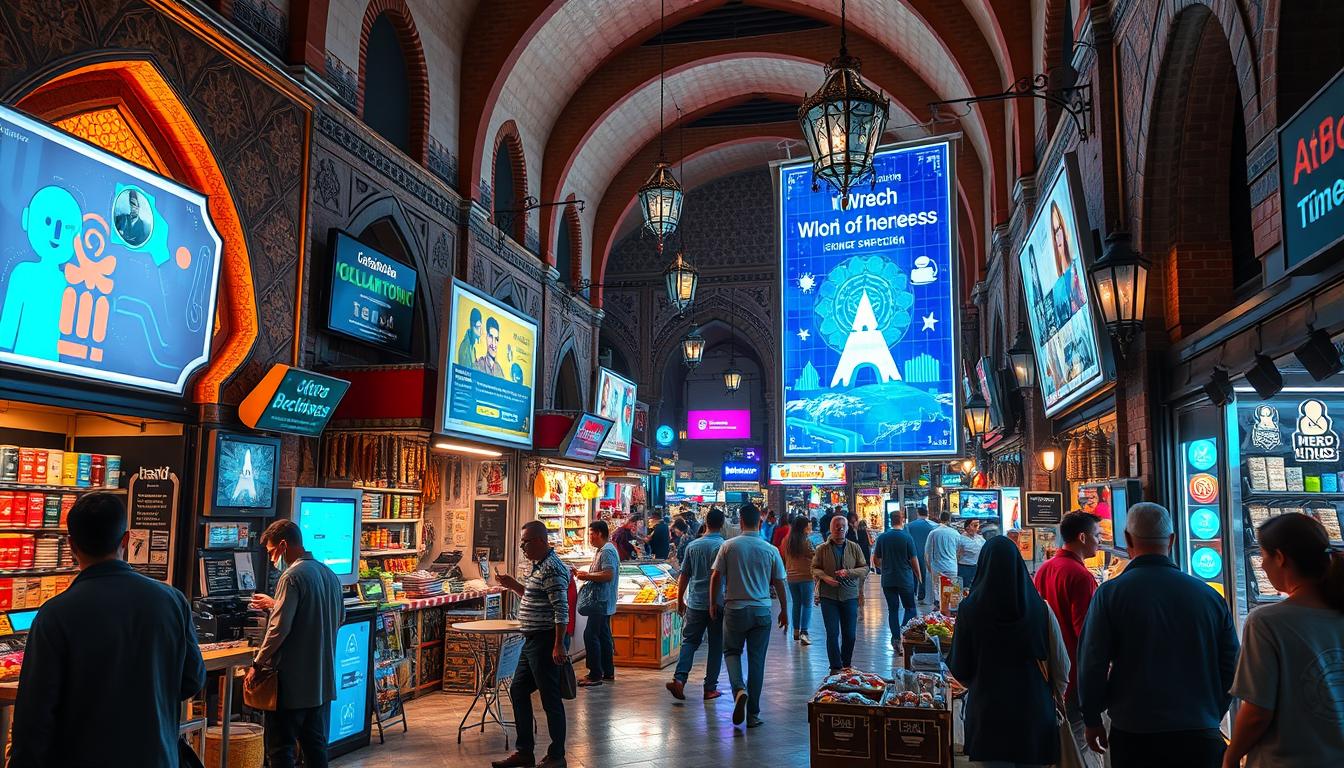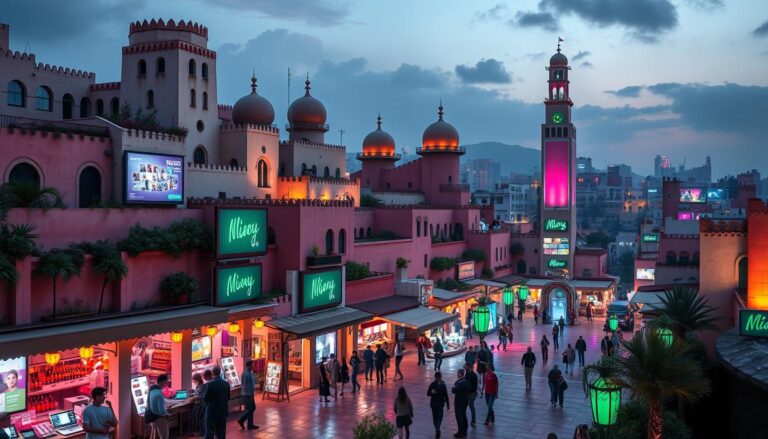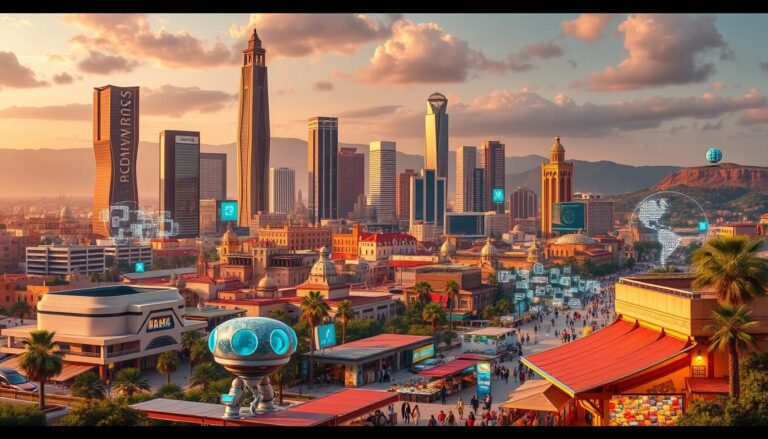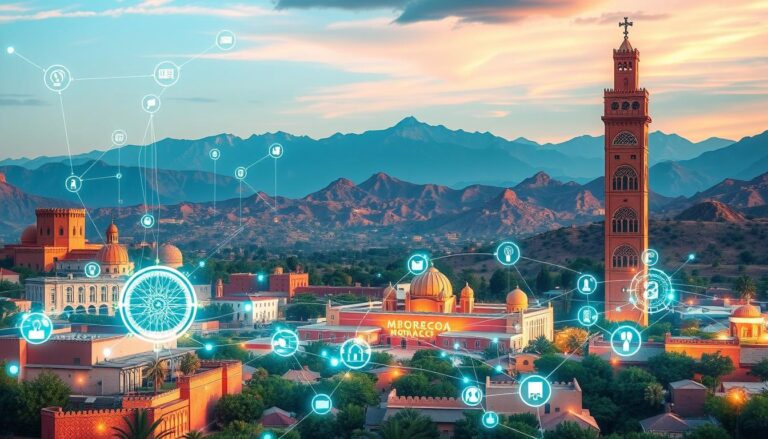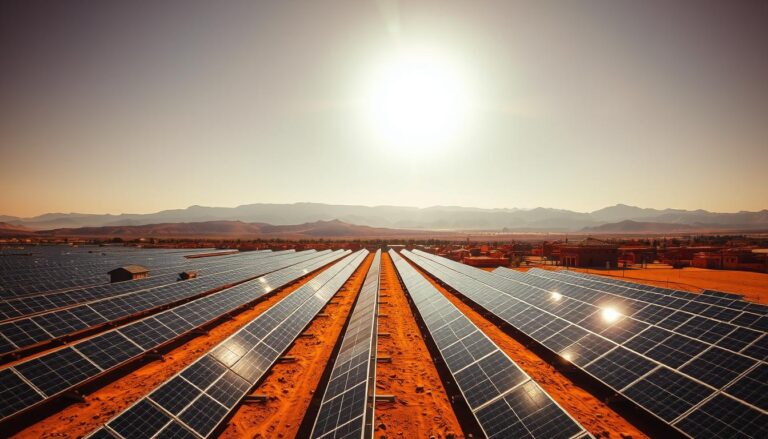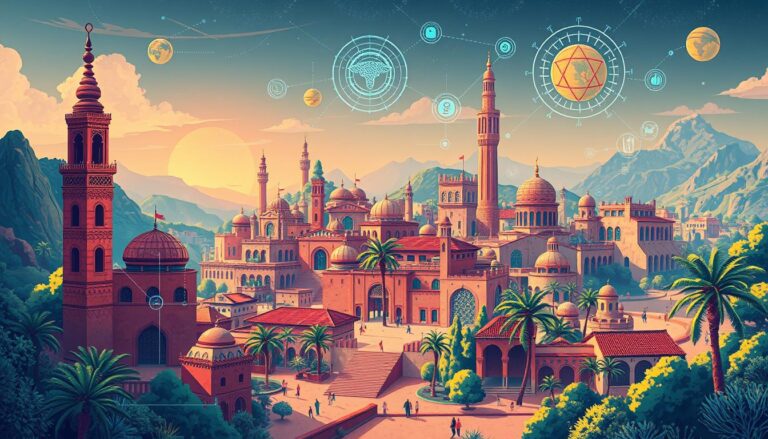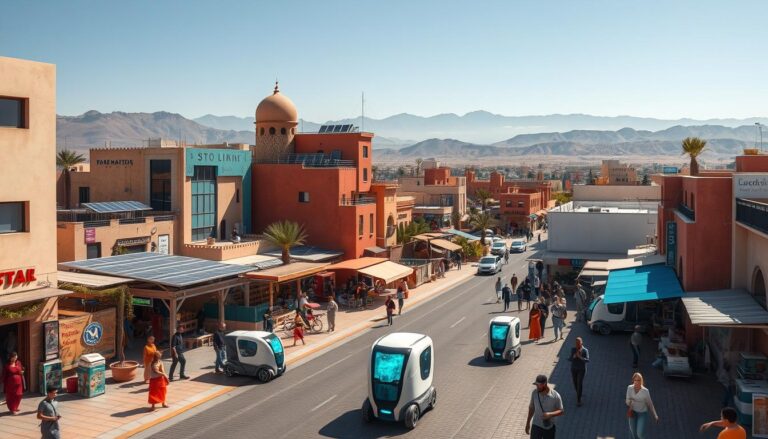Is artificial intelligence the key to Morocco’s digital transformation and economic renaissance? Morocco aims to become a global digital leader. It has a $1.1 billion budget for the Digital Morocco 2030 strategy.
The goal is to create 240,000 new jobs in the digital sector. They also want to boost digital export revenues to 40 billion dirhams ($4.15 billion). Morocco hopes to rank in the top 50 globally in the UN Online Services Index.
But are these bold AI solutions for Moroccan industries truly feasible? The country wants to enhance 5G coverage to 70% of its territory. They also aim to establish 3,000 startups.
Morocco has already started using AI in its courts. Justice Minister Abdellatif Ouahbi mentioned this. Tech giants like Intel and regional initiatives like the Rabat Consensus are helping.
Will these efforts lead to Morocco’s digital and economic breakthrough? They aim to add 100 billion dirhams ($10.36 billion) to its GDP. Explore how AI is changing Moroccan businesses and what’s next in this digital journey.
Introduction to AI in Moroccan Business
Artificial intelligence (AI) is changing Morocco’s industries fast. It’s making businesses digital. Morocco wants to be a big player in AI and tech globally. AI is used in many areas, from simple tasks to complex ones like nuclear work.
Overview of AI’s Role in Morocco
Morocco is using AI to make things better and more innovative. They offer training in AI, like for digital marketing and nuclear fields. These programs last from 7 to 120 hours, showing AI’s wide range of uses.
There are special courses for different industries, like AI in marketing and finance. These courses help workers learn AI for their jobs. People in healthcare and finance say these programs are making a big difference.
Importance of AI for Economic Growth
AI is key for Morocco’s economy to grow. It makes things more efficient and opens up new business ideas. Training in AI, like machine learning, helps professionals get better at tech.
The “AI Foundation Certification” teaches important AI skills. It covers different types of learning. AI is being used in both public and private sectors. This makes businesses more productive and helps Morocco grow digitally.
Digital Morocco 2030 Strategy
The Digital Morocco 2030 strategy is a big plan by the Moroccan government. It aims to make the economy fully digital. The goal is to improve public services, grow the economy, and become more competitive globally.
By using advanced tech like artificial intelligence, Morocco wants to boost development in many areas.
Objectives and Goals
The main goal of Digital Morocco 2030 is to change the country’s digital scene a lot. The government will spend 11 billion MAD from 2024 to 2026 to help this plan. They plan to train 100,000 young people each year in digital skills.
They also want to create 240,000 jobs in the digital sector by 2030. Plus, they aim to triple the number of digital graduates from Moroccan universities by 2027. They also want to help 3,000 startups grow.
They plan to cover 70% of the country with 5G and reach 1,800 areas that lack digital services. They hope to add 100 billion MAD to the GDP by 2030. By 2026, they will make sure 6,300 public sites have fiber optic connections.
Impact on Public Services
The Digital Morocco 2030 strategy wants to make over 600 public services digital. This will make services better and easier for everyone. It will also make the public sector more efficient.
By using AI, they want to make services more accessible and clear. This will help the Moroccan digital economy grow. They hope to see a big increase in digital exports to 40 billion MAD.
By making public services digital, Morocco wants to become a key player in tech in Africa. They aim to keep growing the economy and encourage entrepreneurship.
The use of AI in companies will change public services a lot. It will help manage data better, make decisions easier, and get citizens more involved. This big plan in the Moroccan digital economy will create 130,000 jobs in IT by 2030. They also hope to see the rise of tech unicorns by 2030.
AI and Blockchain in Moroccan Government Services
Morocco is moving fast with its Digital Morocco 2030 plan. It’s using AI and blockchain to change public services. A big part of this is making a Unified Administrative Services Portal.
Unified Administrative Services Portal
The Unified Administrative Services Portal is a big step for Morocco. It uses blockchain and AI to manage public services better. This makes it easier for people and businesses to get what they need.
AI and blockchain help cut down on delays and make things more open. This makes the government work better and be more open to everyone.
Improving Transparency and Efficiency
Blockchain and AI are key for making things clearer and more efficient. AI helps check and understand data quickly. This helps the government make better choices faster.
Blockchain keeps public records safe and sound. This builds trust with the people. It also helps Morocco look better on the world stage.
The Digital Morocco 2030 plan is big. It wants to create 240,000 jobs and add $10.36 billion to the GDP. It also aims to grow digital exports and start new businesses.
Morocco wants to use AI and blockchain to improve services and reach new heights. It plans to digitize more services and get better at using 5G. It also wants to move up in the UN’s Online Services Index.
Places like Binance Academy and Blockchain Centre are helping. They plan to teach a lot of students about blockchain. Moroccan startup Tookeez is using blockchain for new customer programs.
Morocco is really going for it with digital change. It’s making a future where AI and blockchain are key for growth and good government.
Growth of AI-Driven Startups in Morocco
Morocco’s startup scene is growing fast, thanks to a supportive legal framework. The Digital Morocco 2030 strategy aims to make the country a digital leader by 2030. It has a budget of $1.1 billion to support this goal.
The strategy focuses on building a strong AI ecosystem. It aims to create 240,000 new jobs in the digital sector. These jobs will be in AI, blockchain, cybersecurity, and data analytics.
Supportive Legal Framework
Morocco’s laws are being updated to help AI startups grow. The country wants to attract international companies and tech startups. It aims to become a top choice for foreign investment in tech.
Special programs in AI, blockchain, and data science are being developed. These programs will help professionals develop the skills needed for the digital economy.
Key Startups to Watch
Several innovative startups are emerging in Morocco’s AI ecosystem. DeepLeaf uses AI to improve farming and save resources. Palm offers AI-powered talent management solutions to companies.
Atlan Space uses AI-driven drones to fight environmental crimes. This helps protect natural resources.
KWIKS is an AI-driven recruitment startup that has raised 8 million dirhams. It was founded in 2022 by Amine Khayatei Houssaini. KWIKS connects employers with headhunters using AI.
Its AI tool, “HAFIDA,” conducts automated video interviews. It uses machine learning to evaluate candidates. Another tool, “R2DS,” generates detailed reports beyond traditional CV screenings.
The global market for AI in recruitment is expected to reach $3 billion by 2027. This presents big opportunities for startups like KWIKS. Morocco supports high-potential startups through programs like “R&D Maroc 60 Startups.”
AI startups like KWIKS are shaping the future of work. They are making Morocco a key player in the global digital landscape.
Adoption of AI in Moroccan Companies
Moroccan companies are quickly adopting artificial intelligence. They are creating solutions that meet the needs of different industries. The use of machine learning in Morocco boosts efficiency and innovation. Companies across many sectors are using AI solutions for Moroccan industries to stay ahead.
Industry-Specific Applications
AI is being used in many industries in Morocco:
- Agriculture: AI helps with precision farming and smart irrigation. This improves crop yields and resource use.
- Human Resources: AI algorithms make hiring and keeping employees better. This leads to a more efficient workforce.
- Environmental Surveillance: AI is used to monitor and solve environmental problems. This helps make sustainability better.
Case Studies of Successful Implementations
Here are some examples of AI success in Moroccan industries:
A leading agricultural firm used machine learning to predict weather and plan planting. This boosted productivity by 20%.
AI in talent management has also been a hit, especially in big companies like OCP Group. These systems help match candidates with jobs better. This has cut down recruitment costs a lot.
AI in environmental monitoring has helped companies keep track of pollution. They can then take steps to lower emissions.
In summary, Morocco’s use of AI in different sectors shows its dedication to using technology for growth. This sets a good example for other countries to follow.
Challenges and Concerns with AI Adoption
Artificial intelligence is changing Morocco’s business world. But, there are many regulatory and ethical worries. It’s important to tackle these issues to make sure AI is used wisely and for good.
Regulatory Concerns
One big issue is the need for strong AI regulation in Morocco. The General Union of Moroccan Workers (UGTM) wants strict rules. They suggest creating a National Agency for Artificial Intelligence to handle data privacy and security.
Digital tech is also causing environmental problems. By 2020, it was responsible for 1.8 to 6.3% of global carbon dioxide emissions. This shows why we need to control how we use technology to protect our planet.
Morocco is working with UNESCO on AI ethics. This shows they’re serious about handling AI’s ethical side. The European Council also warns about AI’s dangers to human rights and freedoms. They stress the need for careful rules.
Potential Misuses of AI
There’s a big worry about AI being used badly. Bad uses could include cyberattacks, fake videos, and spreading false information. AI in work can also affect employees’ rights and privacy during hiring.
Morocco has laws to protect personal data. But, AI could still threaten basic rights like freedom of speech and privacy. It’s key to be aware of these risks, especially since 80% of Moroccan consumers know about ChatGPT, with 38% using it.
In conclusion, it’s crucial to address AI regulation and ethical concerns in Morocco. This will help us use AI’s benefits while protecting our values and rights.
AI’s Impact on Job Creation in Morocco
Artificial intelligence (AI) is set to change job creation in Morocco. It aims to create about 240,000 new jobs by 2030. This move is part of Morocco’s plan to use AI for economic growth, affecting the economy greatly.
“AI has the potential to reshape job markets, creating new categories of employment while transforming existing roles.”
AI is changing sectors like agriculture, which makes up 12% of Morocco’s GDP and employs 30% of the workforce. The use of AI can make farming more productive and efficient.
With 22.6% of youth unemployed, AI offers a big chance. Already, 38% of Moroccans use tools like ChatGPT for learning. This shows a growing workforce ready for AI jobs.
However, 23% of jobs in North Africa might be automated by 2027. Morocco is among Africa’s top 10 for AI readiness, according to the International Monetary Fund. This is good news.
AI’s effect on Morocco’s economy goes beyond jobs. It also helps leaders make better decisions. A study on AI in sectors like banking and healthcare shows how AI can improve leadership. Moroccan leaders can become more competitive and sustainable with AI.
- Strategic analytics: Enhances data-driven decisions and performance optimization.
- Adaptive machine learning management: Promotes continual learning and real-time responses.
- Collaboration and research: Essential for developing robust AI frameworks.
To make the most of AI, policymakers need to invest in AI technology, training, and ethics. This will help Morocco’s job market grow in a sustainable and ethical way. It will shape a future where the economy is innovative and adaptable.
Future Prospects of AI in Moroccan Business
Morocco is set to be a leader in Africa’s tech future, thanks to AI. The opening of the International Center for Artificial Intelligence at Mohammed VI Polytechnic University in November 2022 is a big step. It shows Morocco’s dedication to leading in AI innovation across the continent.
Predictions and Forecasts
AI is changing many sectors in Morocco, especially with the Internet of Things (IoT). This mix promises better data handling and new tech breakthroughs. It’s expected to lead to more efficient business models and creative solutions.
The Ai Dome in Rabat, led by Amal El Fallah Seghrouchni, aims to use AI for Africa’s good. It sets an example for other African countries to follow.
AI is also changing education in Morocco. It’s making learning more personal, offering real-time translation, and improving STEM education. Programs like the AI summer school at Al Akhawayn University and MoroccoAI are getting the youth ready for the future.
Potential for Global Collaboration
Morocco is focusing on building a strong AI ecosystem. This makes it a key player in global AI partnerships. The MoroccoAI conferences, with experts like Prof. Geoffrey Hinton and Prof. Yoshua Bengio, show Morocco’s commitment to international collaboration.
Morocco’s AI efforts are also about sustainable development and tackling global issues. It’s using its skilled workforce, promoting learning, and supporting startups. The National AI Strategy Report offers 44 recommendations to help Morocco stay ahead in AI innovation and use AI responsibly.
Conclusion
Morocco is taking big steps towards a future filled with technology and strong economy. The Digital Morocco 2030 strategy is a detailed plan for digital growth. It aims to boost the economy, improve public services, and create a competitive AI environment.
AI is being used in many areas like finance, insurance, and telecom. This shows Morocco’s push for modern and efficient systems. AI is also making the judicial system better by automating tasks and analyzing legal data.
The talk about AI’s effect on jobs in Morocco is important. It shows the need to train workers for new roles. Businesses and authorities must find ways to use AI wisely and protect jobs.
Building a skilled workforce is key for AI’s success in Morocco. This means ongoing education and adding AI to school curricula.
Morocco is also focusing on keeping data safe and using AI ethically. Laws like Law 09-08 protect personal data. These steps make sure Morocco’s AI growth follows European standards, building a solid base for future progress.
Source Links
- Morocco turns to AI, blockchain to achieve ‘digital hub’ goal by 2030
- Morocco to use AI in courts
- Artificial Intelligence (AI) Training in Morocco
- Artificial Intelligence Foundation Training in Morocco | AI Introduction Course for Beginners in Morocco
- Morocco goes digital with 2030 strategy focused on innovation, growth, and services
- Moroccan Digital Transformation Strategy 2030:
- Atalayar – Las claves del mundo en tus manos
- Distributed ledger technology to play a central role in Morocco’s 2030 digital strategy
- Morocco Unveils 2030 Digital Strategy
- Digital Transformation Center Morocco | BMZ Digital.Global
- Morocco to Leverage AI and Blockchain in Ambitious Plan to Become Digital Hub by 2030
- Morocco’s KWIKS Raises $800K to Cut Recruitment Time by Two-Thirds Using AI
- Morocco is the second country in the world in the use of ChatGPT
- The Barriers to AI Adoption in Supply Chains: Case of Moroccan Companies
- Ethical and Legal Regulation of Using Artificial Intelligence in Morocco | Jabir | Journal of Digital Technologies and Law
- Morocco leads Africa in ChatGPT adoption – SAMENA Daily News
- Morocco’s Digital Transformation: Harnessing AI in Education and Business
- Factors driving the adoption of artificial intelligence technology in the recruitment process in…
- Navigating the AI Landscape in Morocco: Opportunities and Innovations
- AI and education: “Morocco is not the country to miss out”. Interview with Dr Abdelilah Kadili.
- MoroccoAI
- Artificial Intelligence and Its Impact on the Moroccan Labor Market: Job Disruption or Transformation?
- Morocco: Artificial Intelligence in the Moroccan legal framework

The Editorial Team is a passionate group of Morocco enthusiasts dedicated to sharing the beauty, culture, and wonders of this captivating country. With diverse backgrounds and a deep love for travel, we strive to bring you engaging and informative content that inspires your Moroccan adventures. From uncovering hidden gems and sharing local insights to exploring mouthwatering cuisine and showcasing the vibrant lifestyle, our team is committed to providing you with valuable resources and exciting stories that enhance your exploration of Morocco. Join us on this journey as we celebrate the rich heritage and unforgettable experiences that make Morocco truly special.

